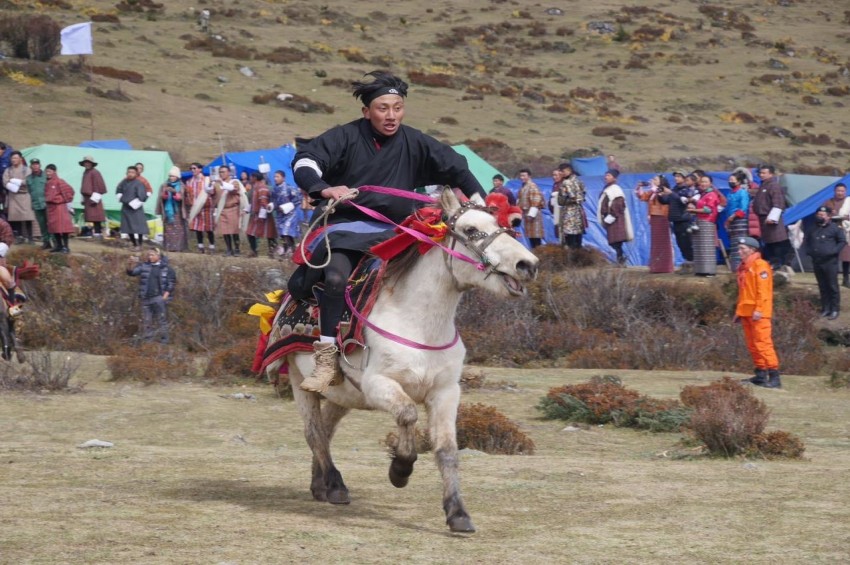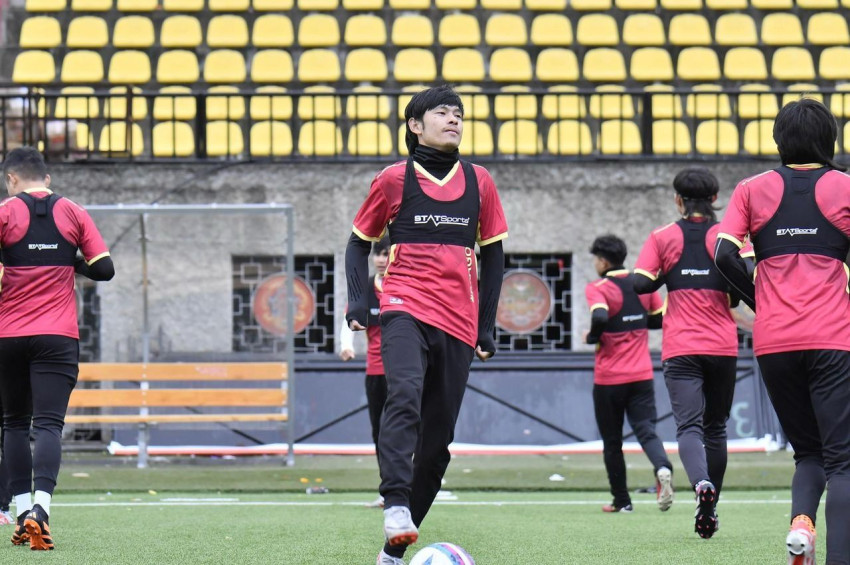Horse racing is a spectacular event
Sangay Palden, an 18-year-old horseman, and his brotherly 16-year-old horse, Ratu bring pride to the semi-nomadic community of Soe on winning the first position during the fifth Royal Highland Festival (RHF) held at Laya, Gasa.
The boys demonstrated a new height of teen spirit amusing the crowds and visitors gathered to celebrate and showcase the unique culture and simple way of living during the annual RHF festival.
Being the youngest among the seven horsemen from Soe, Laya, and Lingzhi exposing their athletic prowess and the strength of their horses, the victory moment for Sangay and horse Ratu easily captures the crowd’s appreciation.
The teenager said, “Riding my beloved horse Ratu and chasing dreams together and winning the Laya festival horse race is one feather on my cap. I cherish the moment.”
“I couldn’t have done it without my horse. We are working out well and I’m thankful to my horse for the win,” added Sangay Palden.
The horseman usually referred to as Ta-open or Ta-drep in Dzongkha first met his race-winning horse about a decade ago. They immediately bonded although Sangay Palden only attempted to try horse riding at the age of 13.
Sangay Palden dropped out as a class VI student in 2017 when he was just 12 years old to help his semi-nomadic parents with household chores being the only son in the family unit.
A year later he joined his friends and relatives as a pony porter when he turned 13 to cater porter service to tourists and visitors. Since then, he grew fond of the horses which plays an integral role for the families living in the mountains of Soe.
Horses like other highland animal yaks are an economic lifeline for the Soe community located some 3,000 meters above sea level under Lingzhi Dungkhag in Thimphu.
Sangay Palden claimed that his interest in the horses and mules grew over time after getting to know their behaviors and personality. As a child, he was fascinated to see how powerful, yet so playful those horses, ponies, and mules were but held himself back and focused on his studies.
He said, “I was a little nervous and uncomfortable riding horses. But as days passed, I understood horse feelings and learned to differentiate between load-carrying horses and riding horses.”
Today, Sangay and his family own nine horses and mules as an economic backbone to generate income during tourist season carrying heavy loads on trekking routes.
However, their Ratu, the white racing or riding horse owns a special place in Sangay’s heart. Thus, groomed and cared for more compared to the load-carrying horses and mules.
“Not every horse can be used for racing or carrying people on its back. But those horses used to carry people are treated better. We usually use mules to transport heavy items,” said Sangay.
Ratu is being served great meals and treats, dressed and decorated in special textiles and fabric for his human brother knows his value.
Out of curiosity Sangay Palden and Ratu first participated in a horse riding race when the pony porter turned 14 during the Jhomolhari Mountain festival. They loved competing with other horsemen and horses. Thus, they participated once more in the 2019, Jhomolhari Mountain festival when Sangay was just 15. They won the second position twice and the Covid-19 pandemic took away the opportunity.
However, they are glad to be back on the rugged and perilous horse racing trek with the re-opening of tourism and resuming of festivities.
However, Sangay Palden realized the risk and danger associated with such competitive races. He said, “Ratu is not used to modern technologies like drones, thus he got nervous and panicked as the drone came flying closer. He almost threw me out.”
He said that horse racing is not for the faint of heart.
“It takes a lot of courage to coax, mount, and direct your race horse or else it’s also a dangerous attempt in an unfamiliar horse race trek and situation. No matter how well you know your horse, they can still surprise you sometimes,” added the horseman.
Sangay claimed that the horse trek in Soe is perilous and longer. it took him almost 30 minutes to reach the finish line during Jhomolhari Mountain Festival. “But the treks in Laya are more narrow, rocky and muddy and more dangerous although the distance is shorter,” he said.
Although Sangay couldn’t record the timing of the race completion, he believes that they took almost 15-20 minutes.
Sangay shared the importance of physical and mental preparedness if one is intending to take part in a horse riding race.
“Sometimes, horses get confused although they have the natural ability on the track. Thus, as a rider, we need to guide the and know when to increase or decrease the intensity of the movement pace,” said the winner of the horse race.
Sangay plans to participate in horse races in the coming years. Although there’s no stark difference between the mountain festival and the highland festival, Sangay claimed that the highland festival was merrier with more people. “I wish more people also visit mountain festival so that people know more about our village too.” added the teenager.
Until his next race, Sangay is planning to feed his porter horses and ride horses with a balanced diet and get them fit for the service which usually fetches him Nu 80,000 in two weeks. as a porter her treks Laya, Soe Yaksa, Dhodheda where there are no motorable roads along with the visitors. “I treak those rugged terrains at least six times a year, depending on the number of visitors.”
The horseman from Soe picks up their guests from Shana near Gunitsawa, about 12 kilometers away from Drukgyal Dzong in Paro.
For the teenager, the work as a porter is no less than some office-going people as they start at 9 am and rest by 5 pm. “however, I think we get paid better but also we need to feed a balanced diet to our horses.”
Apart from riding horses, managing horses, and trekking, Sangay loves watching his horses galloping freely on their days off. He also likes aesthetically grooming his horses, particularly Ratu.
He said, “I developed an incredible bond with Ratu and I have a deep understanding of his traits and moods. But I love all my horses.”
Sangay and Ratu returned home with great memories of the Royal Highland Festival and prize money of Nu 10,000.
Sangay Palden, an 18-year-old horseman, and his brotherly 16-year-old horse, Ratu bring pride to the semi-nomadic community of Soe on winning the first position during the fifth Royal Highland Festival (RHF) held at Laya, Gasa.
The boys demonstrated a new height of teen spirit amusing the crowds and visitors gathered to celebrate and showcase the unique culture and simple way of living during the annual RHF festival.
Being the youngest among the seven horsemen from Soe, Laya, and Lingzhi exposing their athletic prowess and the strength of their horses, the victory moment for Sangay and horse Ratu easily captures the crowd’s appreciation.
The teenager said, “Riding my beloved horse Ratu and chasing dreams together and winning the Laya festival horse race is one feather on my cap. I cherish the moment.”
“I couldn’t have done it without my horse. We are working out well and I’m thankful to my horse for the win,” added Sangay Palden.
The horseman usually referred to as Ta-open or Ta-drep in Dzongkha first met his race-winning horse about a decade ago. They immediately bonded although Sangay Palden only attempted to try horse riding at the age of 13.
Sangay Palden dropped out as a class VI student in 2017 when he was just 12 years old to help his semi-nomadic parents with household chores being the only son in the family unit.
A year later he joined his friends and relatives as a pony porter when he turned 13 to cater porter service to tourists and visitors. Since then, he grew fond of the horses which plays an integral role for the families living in the mountains of Soe.
Horses like other highland animal yaks are an economic lifeline for the Soe community located some 3,000 meters above sea level under Lingzhi Dungkhag in Thimphu.
Sangay Palden claimed that his interest in the horses and mules grew over time after getting to know their behaviors and personality. As a child, he was fascinated to see how powerful, yet so playful those horses, ponies, and mules were but held himself back and focused on his studies.
He said, “I was a little nervous and uncomfortable riding horses. But as days passed, I understood horse feelings and learned to differentiate between load-carrying horses and riding horses.”
Today, Sangay and his family own nine horses and mules as an economic backbone to generate income during tourist season carrying heavy loads on trekking routes.
However, their Ratu, the white racing or riding horse owns a special place in Sangay’s heart. Thus, groomed and cared for more compared to the load-carrying horses and mules.
“Not every horse can be used for racing or carrying people on its back. But those horses used to carry people are treated better. We usually use mules to transport heavy items,” said Sangay.
Ratu is being served great meals and treats, dressed and decorated in special textiles and fabric for his human brother knows his value.
Out of curiosity Sangay Palden and Ratu first participated in a horse riding race when the pony porter turned 14 during the Jhomolhari Mountain festival. They loved competing with other horsemen and horses. Thus, they participated once more in the 2019, Jhomolhari Mountain festival when Sangay was just 15. They won the second position twice and the Covid-19 pandemic took away the opportunity.
However, they are glad to be back on the rugged and perilous horse racing trek with the re-opening of tourism and resuming of festivities.
However, Sangay Palden realized the risk and danger associated with such competitive races. He said, “Ratu is not used to modern technologies like drones, thus he got nervous and panicked as the drone came flying closer. He almost threw me out.”
He said that horse racing is not for the faint of heart.
“It takes a lot of courage to coax, mount, and direct your race horse or else it’s also a dangerous attempt in an unfamiliar horse race trek and situation. No matter how well you know your horse, they can still surprise you sometimes,” added the horseman.
Sangay claimed that the horse trek in Soe is perilous and longer. it took him almost 30 minutes to reach the finish line during Jhomolhari Mountain Festival. “But the treks in Laya are more narrow, rocky and muddy and more dangerous although the distance is shorter,” he said.
Although Sangay couldn’t record the timing of the race completion, he believes that they took almost 15-20 minutes.
Sangay shared the importance of physical and mental preparedness if one is intending to take part in a horse riding race.
“Sometimes, horses get confused although they have the natural ability on the track. Thus, as a rider, we need to guide the and know when to increase or decrease the intensity of the movement pace,” said the winner of the horse race.
Sangay plans to participate in horse races in the coming years. Although there’s no stark difference between the mountain festival and the highland festival, Sangay claimed that the highland festival was merrier with more people. “I wish more people also visit mountain festival so that people know more about our village too.” added the teenager.
Until his next race, Sangay is planning to feed his porter horses and ride horses with a balanced diet and get them fit for the service which usually fetches him Nu 80,000 in two weeks. as a porter her treks Laya, Soe Yaksa, Dhodheda where there are no motorable roads along with the visitors. “I treak those rugged terrains at least six times a year, depending on the number of visitors.”
The horseman from Soe picks up their guests from Shana near Gunitsawa, about 12 kilometers away from Drukgyal Dzong in Paro.
For the teenager, the work as a porter is no less than some office-going people as they start at 9 am and rest by 5 pm. “however, I think we get paid better but also we need to feed a balanced diet to our horses.”
Apart from riding horses, managing horses, and trekking, Sangay loves watching his horses galloping freely on their days off. He also likes aesthetically grooming his horses, particularly Ratu.
He said, “I developed an incredible bond with Ratu and I have a deep understanding of his traits and moods. But I love all my horses.”
Sangay and Ratu returned home with great memories of the Royal Highland Festival and prize money of Nu 10,000.











